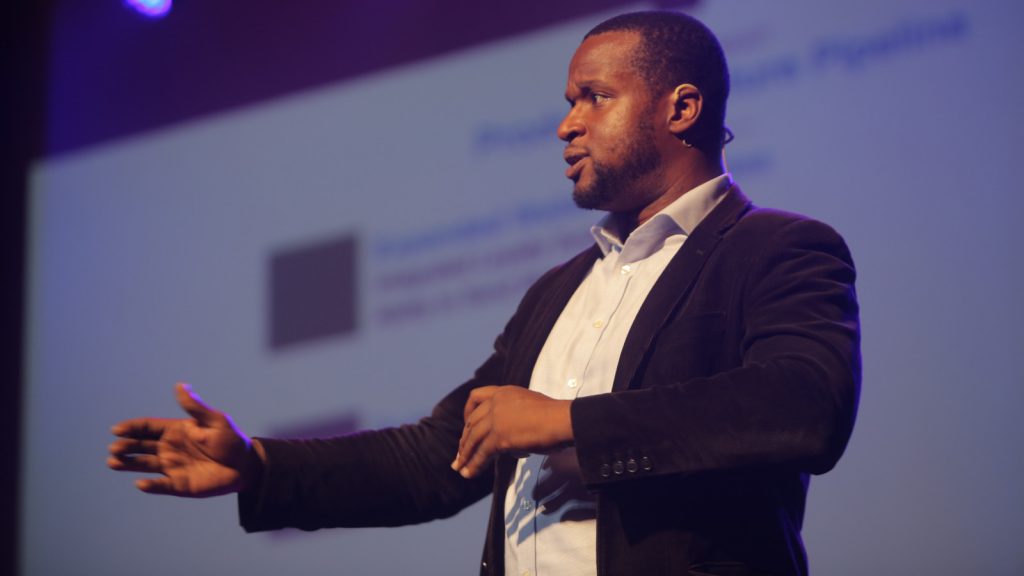South Africa’s esports scene is set for a major showdown as Hyprop and MTN introduce SHIFT COD, a Call of Duty tournament forming part…
Ride-hailing startup Gozem to launch a digital wallet, delivery services next year

The co-founder of ride-hailing startup Gozem — which operates in West Africa’s Benin and Togo — has revealed that his startup plans to launch a digital wallet product as well as a food and parcel delivery service next year.
Emeka Ajene (pictured above) founded the startup last year with Singapore-based co-founder Raphael Dana. Ajene, who is Gozem’s managing director, in 2016 led operations and business development for Uber in Nigeria.
The Singapore-registered startup operates a ride-hailing service that relies on motorcycle-taxis, auto-rickshaws and air-conditioned taxis. The company last month began operating in Benin, after launching in Togo last year.
Since Emeka Ajene and Raphael Dana founded Gozem last year, the startup has raised over $3m
The plan now is to expand to 10 counties in West and Central Africa over the next three years. These include Cameroon, Gabon, Ivory Coast, Senegal, Burkina Faso, the Democratic Republic of Congo (DRC), Ghana, Nigeria and Rwanda.
Preparing for Series-A round
Since launching last year the founders have raised over $3-million in funding and the startup is currently closing its second seed round of $3-million in preparation for its Series-A round.
Gozem currently has 800 drivers registered on its platform. Ajene said the startup is aiming to drive this number up to 3000 by the end of the year and grow this to 300 000 over the next five years.
Since its launch in November last year, close to 130 000 users have registered with Gozem.
Ajene explained in an email to Ventureburn earlier this week that he and Dana decided to register the startup in Singapore because part of the startup’s founding team is based there.
“Singapore, and the South-East Asia region, is the operational hub of Grab and Go-Jek (Two popular Asian transport, delivery and payment platforms — Ed) and in these markets investors fully understand the model that we’re replicating which is a great help when we approach them about investing in Africa,” he said.
It probably helps that both founders have strong networks in the venture capital world. Ajene has worked with the GSMA’s Innovation Fund across Africa and the Asia Pacific region as a member of its Ecosystem Accelerator Selection Panel.
Dana, a serial entrepreneur, has been a managing partner of Africa-focused venture holding company Reengine Ventures since 2016.
Without revealing any names, Ajene said the majority of Gozem’s investors are high net-worth individuals from across the globe.
‘Aim to replicate success of Go-Jek, Grab’
According to UN online publication “The Africa Renewal“, in 2017 there were about 60 ride-sharing services in 21 countries on the continent.
Some of the biggest and well known players include Max.ng, Swvl, Gokada. These are competing with Silicon Valley juggernaut Uber, as well as international startups like Estonia’s Bolt (formely Taxify) and a new entrant in Africa, New York based InDriver.
So what motivated Ajene and Dana to enter this notoriously competitive industry?
The two met around 2016 when Ajene left Uber. He said at the time, he was “increasingly convinced” that business models from the Far East were well suited for Nigeria or West Africa (see this article he wrote on the matter).
Ajene said at the same time Dana, from his time in Singapore, was exposed directly to successful Asian business models and was exploring West African markets given some similarities.
The two realised they were approaching the same ideas from complementary angles.
“Given his first-hand exposure to Grab, GoJek, in South-East Asia and my experience at Uber in Nigeria, we connected around our shared interests and focused on replicating the Grab, GoJek super-app model in the region starting with mobility or ride-hailing,” he said.
“We witnessed the huge successes of companies like Go-Jek and Grab in South-East Asia that leveraged their ride-hailing solutions to develop so-called ‘super-apps’ that have completely digitised society in the region by offering consumers a wide variety of digital services across various verticals like e-commerce, delivery, personal transport, financial services, and more,” explained Ajene.
He added that from the duo’s research and visits to South-East Asia, they found that some African markets today are “quite similar” to where South-East Asian markets were a few years ago across what he said are some “very relevant dimensions”.
Examples of this, he pointed out, include the high proportion of motorcycle taxis working mostly informally.
He added that the founders identified that, as in Asia, these markets are largely inefficient with drivers spending as much as as two-thirds of their active time waiting to get customers every day.
“So we launched Gozem with a focus on West and Central Africa to introduce efficiencies into the personal transport sectors in these markets and to replicate the success of Go-Jek and Grab here in Africa,” explained Ajene.
It’s worth noting that Nigeria’s Max.ng seems to be pursuing a similar strategy. In June, the Lagos-based mobility platform closed a $7-million Series-A round.
Max.ng said at the time that it would use the funding to expand to 10 cities across West Africa, scale its technology infrastructure, deploy mobile payments in partnership with Mastercard, introduce an electric fleet and deploy new vehicle categories, including three-wheel tuk-tuks (see this story).
‘Adoption rate key challenge’
One of the key challenges facing the ride-hailing sector in West Africa, Ajene pointed out, especially with motorcycle-taxis is the adoption rate of and overall comfort with this type of service among traditional drivers.
He said by using smartphones to connect with clients, companies in the sector are revolutionising the way drivers operate.
“In some markets however, large proportions of the traditional driver base did not regularly use smartphones or smartphone apps before Gozem and there can be a steep learning curve.
“Moreover, whereas drivers previously spent the majority of their days waiting for passengers, with Gozem they receive passenger requests at a very fast pace throughout the day, and this can be overwhelming for some drivers,” he said.
Ajene said the startup “invests heavily” in continuous training to assist drivers — who he said have various level of education, literacy and tech-savviness — to master this transition.
“We’re seeing great results with some drivers earning as much as three times more than what they used to before they fully grasped the platform,” he said.
‘Africa-focused super-app’
Ajene explained that he and Dana’s strategy from day one was very clear — they wanted to build a “super-app”.
“We’re aiming to build an Africa-focused super-app that not only offers diverse transportation services to consumers in our markets but that also brings them a full suite of additional digital services like food delivery, delivery of parcels and other items, a digital wallet and related financial or payment services, and more,” he explained.
Ajene said Gozem is currently executing the first phase of its strategy, developing a robust ride-hailing business across two to three markets.
“We’re preparing for the second phase that includes the launch of our digital wallet and delivery services across all our markets,” he added.
With an aggressive expansion strategy, a product road-map that taps into some of Africa’s most important sectors — logistics, transport and payments — and access to capital, Gozem seems set to be one of Africa’s biggest startups.
The question now is will it be behind Africa’s first “super-app”?
Featured image: Gozem managing director and co-founder Emeka Ajene (Supplied)


